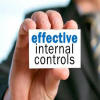|
9.
Implement Internal Controls:

To protect the business you must implement
internal controls.
These controls should include the
following:
- Backup
Financial Data:
Your financial data is critical to your
business.
You should back it up regularly to ensure
that you can gain access to it when needed.
You should use an online service that
lets you gain access to the data year after year
from anywhere.
-
Separate Responsibilities:
The person with purchasing authority
should not be the same person with authorizing
authority.
Unless these two functions are performed
by the owner/founder of the business it should
not be given to the same person.
Giving these two functions to someone
else is opening the door to fraud.
-
Safeguard cash/Checks:
If you have to maintain cash and checks
on hand you should have a safe in a secured area
where it can be maintained.
Limit access to the safe and use alarms
to warn you if anyone attempt to gain
unauthorized access.
-
Safeguard Records:
Safeguard any critical records such as
receipts, invoices, etc.
These are also critical documents.
They should be protected from
unauthorized access, fires, floods, etc.
A fire proof safe is a food place for
storing these documents.
- Conduct
Monthly Reconcillations:
As the owner/CEO of your business you
should conduct monthly reconcillation of the
financial records.
The purpose of this is to ensure that the
procedures are being followed and to uncover
fraud.
|